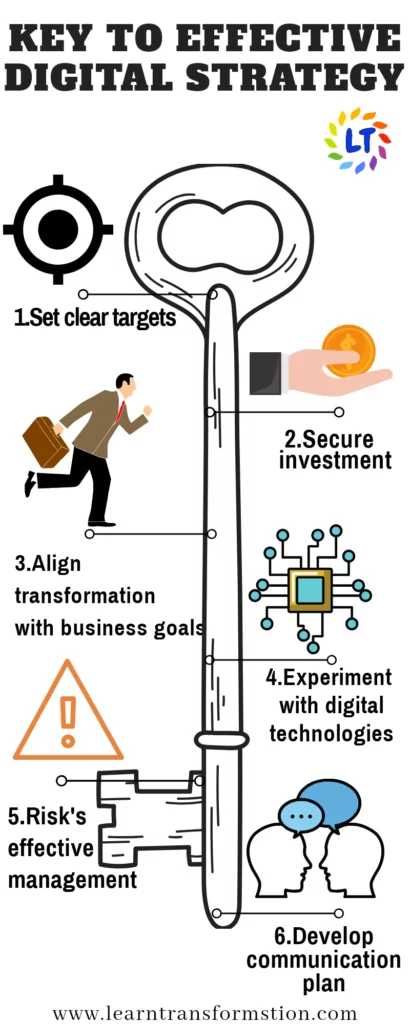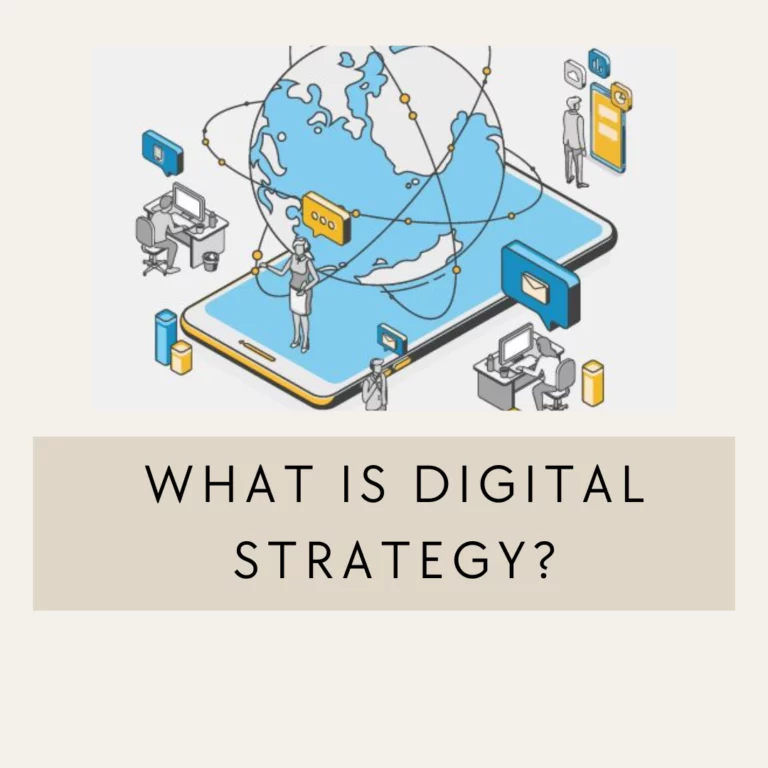“Good judgment comes from experience and experience comes from bad judgments.”
Dr Warne W. Dyer
A digital strategy can be defined as a plan of action that describes how a business must strategically reposition itself in a digital economy. As the habits of customer keep changing, so does the businesses operate.
Key to Effective Digital Strategy
A plan for leveraging the commercial advantages of data assets and technology-focused activities is known as a digital strategy, sometimes known as a digital media strategy. Further, An executive leadership, marketing, and information technology (IT) cross-functional team is necessary for a successful strategy. So, To offer an uniform digital customer experience. Thus, it entails dismantling the silo between information technology leaders and those in other customer-facing departments.
Businesses that embrace change and innovation will prosper in today’s digitally driven environment. Moreover, the idea of a digital strategy—a compass that leads organisations through the dynamic terrain of the digital age—lies at the core of this transition. Thus, this blog tries to debunk the term “digital strategy” and clarify its crucial function in facilitating successful digital transformation.
Establishing a Digital Strategy
A “digital strategy” is a comprehensive plan that outlines how an organization can use digital technologies, resources, and channels to achieve its primary business goals and objectives. It involves more than merely implementing the newest technological trends; it involves a strategic strategy that connects digital activities to the organization’s overarching objective.
Key Components of Digital Strategy:
Clearly defined business objectives:
- Starting with a clear explanation of the organization’s overarching business goals and objectives is essential for developing a digital strategy. Further, these objectives form the foundation for all digital projects.
- For instance, objectives can be to increase sales, boost customer happiness, increase market share, or introduce new goods and services.
Also read: Digital Transformation Done Right: Secrets of Success
Analysis of the target market
- It is critical to comprehend who the target audience is. Moreover, organizations must thoroughly research the demographics, preferences, behaviors, and pain points of their audience.
- Market segmentation and the development of thorough buyer personas help focus digital marketing efforts on the needs of a particular target audience.
Wide-ranging digital ecosystem
- The choice and integration of digital tools, platforms, and technologies fall under this component. Choosing the ideal combination of software, hardware, and cloud services is necessary.
- Additionally, it could consist of e-commerce platforms, analytics tools, customer relationship management (CRM) systems, content management systems (CMS), and more.
Content Management:
- In the digital world, content is the driving force. A clear content strategy outlines the types of material that an organization will produce, how they will be shared, and why.
- Thus, with an emphasis on providing value to the audience, content formats may include blog articles, videos, social media postings, whitepapers, webinars, and more.

Analytics and data:
- Data-driven decision-making characterizes effective digital strategies. To gain insights, organisations should gather, examine, and evaluate data.
- Additionally, web analytics, user behaviour tracking, customer journey mapping, and predictive analytics are important topics.
Design and User Experience (UX):
- A key factor in the success of digital initiatives is the user experience. Digital assets should follow design standards to be responsive, user-friendly, and visually appealing.
- Furthermore, this component includes elements like user interface (UI), mobile optimisation, and website and app design.
Also Read: 5 Key Lean Principles for Leader
Integration of technology:
- Integrating and ensuring the smooth operation of digital tools and systems is essential. This might entail linking different databases, APIs, and software programmes.
- Moreover, integration promotes efficiency by streamlining procedures and improving data flow.
Use of social media:
- A key element of digital strategy is social media. Organisations should describe how they will use social media to interact with their audience, increase brand recognition, and encourage conversions.
- Thus, content calendars, influencer alliances, sponsored advertising, and community management are among possible strategies.
Information Privacy and Cybersecurity:
- Cybersecurity and data privacy are crucial in a time of rising cyberthreats and data breaches. A solid strategy should contain safeguards for both organisational assets and customer data.
- Also, security protocols, encryption, regular vulnerability assessments, and adherence to data protection laws could all be part of this component.
Measurement and Monitoring
- To assess success and make modifications, digital activities must be continuously monitored and measured. To measure achievement, key performance indicators (KPIs) should be created.
- Thus, the impact of digital actions can be measured with the help of tools like Google Analytics, social media analytics platforms, and bespoke dashboards.
These essential elements serve as the foundation of an all-encompassing digital strategy. Successful digital strategies change in response to developing technologies and shifting market circumstances. Furthermore, prioritising these elements and remaining flexible will put organisations in a better position to successfully traverse the digital terrain and accomplish their corporate goals.
Leader’s Tip:
Develop a digital strategy that is in line with your company’s goals, your customers’ needs, and any emerging technologies to gain a competitive edge.
The Role of Digital Strategy in Business Growth:
Detailing the Role of Digital Strategy in Business Growth
Market Growth:
- A wider audience can be reached by businesses using digital tactics. Moreover, websites, social media, and e-commerce platforms are examples of online channels that enable market expansion across national boundaries.
- This growth-promoting expansion creates new revenue sources and clientele categories.
Acquisition and Retention of Customers:
- In order to attract and keep clients, digital marketing methods are essential. Thus, organisations may draw in new clients and turn them into devoted consumers by using focused digital marketing efforts.
- Increased customer relationships are brought about by personalised communication, email marketing, and social media participation, which results in improved retention rates.
Improved Client Experience:
- Exceptional customer experiences are prioritised in digital strategy. Furthermore, websites, apps, and customer service channels that are easy to use increase happiness.
- A positive brand perception is influenced by an effortless online purchasing experience, prompt issue response, and tailored recommendations.
Leader’s Tip:
To stay current and effective, continuously evaluate the digital strategy and make adjustments based on data insights and market realities.
Operating Effectiveness:
- Internal activities are streamlined by digital tools and technologies. Operational efficiency is improved through automating repetitive jobs, streamlining processes, and using analytics to make decisions.
- Overall business growth is influenced by improved resource allocation and decreased operational costs.
Making Decisions Based on Data:
- Data analysis is a key component of digital strategy for making wise choices. Additionally, organisations can detect trends, customer preferences, and opportunities for improvement using data-driven insights.
- Businesses can quickly pivot, improve strategy, and seize opportunities with data as their base, promoting growth.
Competitive Benefit:
- Businesses who adopt digital tactics have an advantage over their competitors. Also, they can outsmart rivals and react to market developments and client requests more quickly.
- Maintaining an edge in the digital world positions businesses as leaders in their fields, bringing in additional clients and partners.
Inventiveness and Adaptation:
- Digital marketing tactics encourage an innovative culture. Businesses can develop new goods and services by experimenting with cutting-edge technology like AI, IoT, and blockchain.
- The ability to adapt to changing technology and market trends ensures long-term relevance and growth.
Measurable outcomes:
- Digital marketing tactics are very quantifiable. To evaluate the efficacy of digital projects, organizations produce key performance indicators (KPIs).
- Organisations may improve plans, manage resources effectively, and maximise returns on investment by monitoring KPIs and analysing results.
Worldwide Reach:
- Digital tactics eliminate geographical obstacles. Platforms for online marketing and commerce give you access to a large worldwide customer base.
- Without requiring a physical presence, businesses can improve their revenue by entering new markets by expanding globally.
Income Generation:
- Revenue generating is the main objective of digital initiatives in the end. Organisations can increase their bottom line by using digital platforms for sales, marketing, and consumer involvement.
- A measurable indicator of the effectiveness of digital strategies is revenue growth.
In conclusion, there are several ways in which digital strategy contributes to business growth. Market expansion, client acquisition and retention, operational effectiveness, data-driven decision-making, competitive advantage, innovation, quantifiable results, global reach, and revenue creation are all included. Digital strategies are crucial for surviving in an increasingly digital-first company environment, as well as for remaining competitive. Additionally, prioritizing and successfully implementing digital initiatives positions businesses for ongoing growth and success.
We promise to give you a top-notch learning experience on all transformational subjects. Such as leadership transformation, business transformation, strategy transformation, quality transformation, operational transformation, supply chain transformation, human resources transformation, financial transformation, lean transformation, and many others.
LT Leader’s development model focus on Self learning> Get domain specific courses> Connect to Coach> Develop more Leaders
Check This : 31 Best Books On Time Management – An Exclusive Collection
Conclusion
In conclusion, organisations must comprehend and implement a digital strategy if they want to succeed in today’s digital-first environment. Moreover, it is the key to utilising technology, data, and internet platforms to their greatest potential to promote growth and success.
Putting the customer first and utilising digital tools and data to improve customer experiences, streamline operations, and stay ahead of the competition, a well-crafted digital strategy is in line with the larger corporate objectives. Thus, it allows companies to reach a wider audience, increase operational effectiveness, and make data-driven decisions. Additionally, a digital strategy is a dynamic plan that changes as the digital world does. It is not a static blueprint. It supports a culture of constant improvement and innovation.
In essence, a solid digital strategy serves as the basis for a successful digital transformation. Thus, it enables organisations to take advantage of technology, data, and connection to realise their objectives and prosper in a world that is becoming more and more digital. If you adopt the fundamental ideas of digital strategy, you’ll be on the right track to succeeding in the digital era rather than merely surviving it.
Key Takeaways
- Digital strategy aligns digital initiatives with overall business objectives.
- Customer-centricity, data-driven decision making, and integration are essential for effective digital strategy.
- Agility, continuous learning, and innovation are key to staying ahead in the digital landscape.
FAQs
What is a digital strategy?
A digital strategy is a plan that outlines how an organization will leverage digital technologies, channels, and data to achieve its business objectives and gain a competitive advantage.
What does a digital strategy entail?
A digital strategy entails various components, including identifying digital goals, understanding the target audience, selecting relevant digital channels, allocating resources, integrating digital initiatives with the overall business strategy, and measuring performance.
Must Watch :

